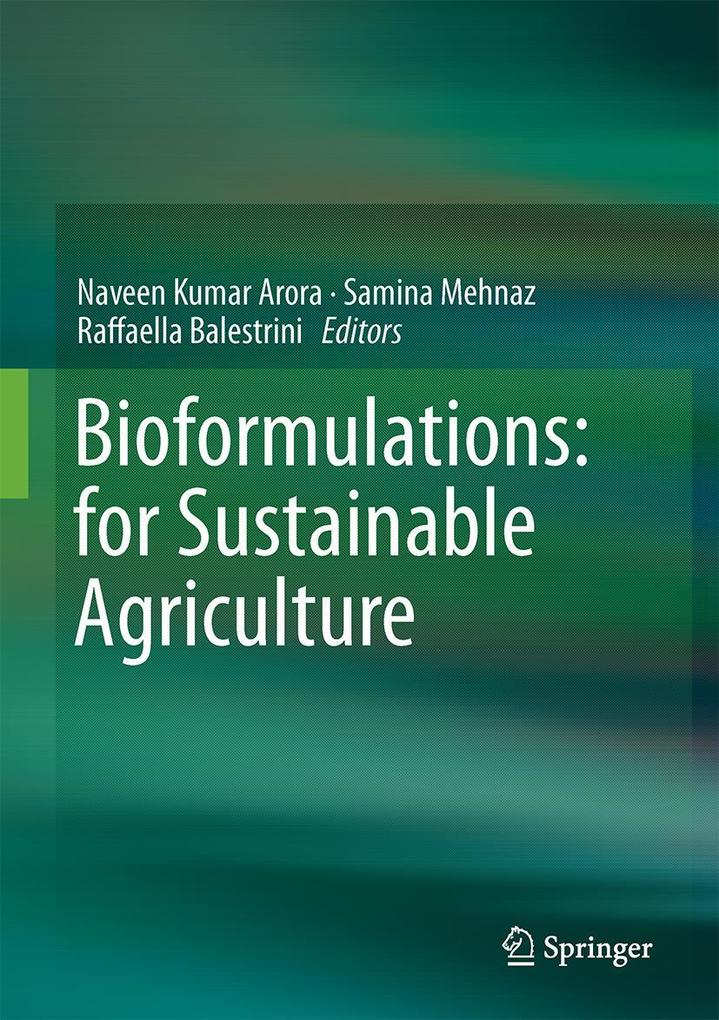
Zustellung: Mi, 16.07. - Sa, 19.07.
Versand in 7 Tagen
VersandkostenfreiBestellen & in Filiale abholen:
More than a century has passed since the first bioformulations were introduced to the market. But there is still much to be done, explored and developed. Though bioformulations offer green alternatives and are important for sustainable agriculture, they make up only a small fraction of the total additions used to enhance crop yields or protect them from pests. There is a great need to develop bioformulations that can promote confidence among end users; accordingly, it is imperative that bioformulations to replace chemicals be reliable and overcome the shortcomings of the past.
Bioformulations: for Sustainable Agriculture discusses all the issues related to the current limitations and future development of bioformulations. It examines in detail those bioformulations that include biofertilizers and biopesticides (also commonly known as bioinoculants), presenting a global picture of their development. Further chapters address diverse microbes that are already being orcould be used as bioformulations. The book also discusses the techniques, tools and other additions required to establish bioformulations as trustworthy and global solutions. It assesses the types of bioformulations currently available on the market, while also considering the future roles of bioformulations, including the reclamation of marginal and polluted soils. Further, it discusses the current legislation and much-needed amendments. Overall the book provides a comprehensive outlook on the status quo of bioformulations and the future approaches needed to improve them and achieve sustainable agriculture and food security without sacrificing the quality of soils. This will be extremely important in offering chemical-free foods and a better future for generations to come.
Inhaltsverzeichnis
Part 1. Introduction. - 1. Bioformulations for Plant Growth
Promotion and Combating Phytopathogens: A Sustainable Approach. - 2. Formulation
Technology of Biocontrol Agents - Present Status and Future Prospects. - 3. Beneficial
Microorganisms: Current Challenge to Increase Crop Performance. - 4. The
Production and Potential of Biofertilizers to Improve Crop Yields. - 5. Effect of
Bioinoculants on the Quality of Crops. - Part 2. Diverse Applications. - 6. The Biological Potential of Arbuscular
Mycorrhizal Fungi. - 7. The Use of Arbuscular Mycorrhiza Fungi in Combination with
Trichoderma spp. in Sustainable Agriculture. - 8. Bioformulations of Novel Indigenous
Rhizobacterial Strains for Managing Soilborne Pathogens. - 9. Bio-Based and
Reduced-Risk Strategies for the Management of Phytophthora Blight and Root Rot of
Pepper. - 10. Formulation of Pochonia chlamydosporia for Plant and
Nematode Management. - 11. Improvement of Crop
Protection and Yield in Hostile Agroecological Conditions withPGPR Based
Biofertilizer Formulations. - 12. Use of Indigenous Cyanobacteria for
Sustainable Improvement of Biogeochemical and Physical Fertility of Marginal
Soils in Semiarid Tropics. - Part 3. Present Scenario and Future. - 13. The
Contribution of Secondary Metabolites in the Success of Bioformulations. - 14. Encapsulation
Techniques for Plant Growth Promoting Rhizobacteria. - 15. An Overview of
Globally Available Bio-Formulations. - 16. Regulation of Biopesticides: Global
Concerns and Policies.
Produktdetails
Erscheinungsdatum
16. Juni 2016
Sprache
englisch
Auflage
1st edition 2016
Seitenanzahl
312
Herausgegeben von
Naveen Kumar Arora, Samina Mehnaz, Raffaella Balestrini
Verlag/Hersteller
Produktart
gebunden
Abbildungen
X, 299 p. 49 illus., 39 illus. in color.
Gewicht
857 g
Größe (L/B/H)
260/183/22 mm
ISBN
9788132227779
Entdecken Sie mehr
Bewertungen
0 Bewertungen
Es wurden noch keine Bewertungen abgegeben. Schreiben Sie die erste Bewertung zu "Bioformulations: for Sustainable Agriculture" und helfen Sie damit anderen bei der Kaufentscheidung.









